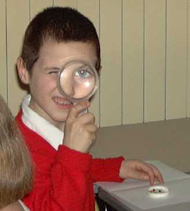 Remember those Magic Eye posters from the 90’s?
Remember those Magic Eye posters from the 90’s?
They were totally cool.
You’d stare into the image.
You’d relax your eyes.
And eventually, a “hidden picture” would appear!
The scientific name for this kind of image is an autostereogram. They allow people to see 3D images by focusing on 2D patterns.
According to the Magic Eye website:
“Autostereograms produce an illusion of depth using only a single image. The computer-generated image repeats a narrow pattern from left to right. Then, by decoupling eye convergence from focusing operations, a viewer is able to trick the brain into seeing a 3D scene.”
Now, if you’ve ever found yourself staring at a Magic Eye poster for an extended period of time, you know how frustrating it can get.
Especially when one of your smarty-pants friends walks by and says, “Hey, look! A sailboat! Cool…”
This makes you want to yell, “No, shut up! I haven’t seen it yet! Go away!”
OK. Settle down. It’s just a picture.
ANYWAY, HERE’S MY QUESTION: what was the difference between your vision and your friend’s vision?
Simple: your friend softened her eyes.
See, we live in a hyperspeed, A.D.D., instant-gratification, advertisement-saturated culture. It’s information overload!
And millions of powerful forces are constantly vying for your precious time and attention.
So, “softening your eyes” is more than just a technique, it’s a philosophy. And it’s not just physical, it’s mental and spiritual as well:
It’s about slowing down.
It’s about noticing the novelties of life.
It’s about studying ordinary things intently.
It’s about making the mundane memorable.
It’s about being mindful of your surroundings.
AND HERE’S THE BEST PART: when you maintain a Soft Eyes Philosophy, three cool things happen:
1. You OPEN your mind to the world around you.
Which means your optical guard lets down.
Which means you’re less likely to neglect key opportunities.
Which means you’re more willing to accept multiple perspectives.
RESULT: more ideas for your business.
2. You OBSERVE patterns quicker and more frequently.
This enables you to make connections between seemingly unrelated things.
This enables you to notice things and give them names.
This enables you to have more creative thoughts.
RESULT: better ideas for your business.
3. You ORGANIZE your thoughts with ease and comfort.
Which helps you filter them through your personal theory of the universe.
Which makes them YOUR unique ideas and theories.
Which makes them easier to spread.
RESULT: word-of-mouth worthy ideas for your business.
All from Softening Your Eyes.
Now, as you’ve probably guessed by now, we’re not exactly talking about Yoga here.
(Although, physically softening your eyes is a great relaxation technique!)
So, if you want to put the Soft Eyes Philosophy into practice, consider this list of 13 leverage questions to ask yourself (and your team) on a daily basis:
1. How are these issues related to each other?
2. How could you use this as an example in your work?
3. How does this fit into your theory of the universe?
4. How does this have to do with your expertise?
5. How is this a symbol or example of you expertise?
6. What did you (just) learn from this experience?
7. What does this have to do with you?
8. What else can be made from this?
9. What else does this make possible?
10. What else is like this?
11. What is around you that you can use?
12. What’s the key idea here, regardless of the context?
13. What’s the Universal Human Emotion?
HERE’S YOUR FINAL CHALLENGE: if you truly want to LIVE this philosophy, try this. Write a few of these questions on sticky notes and post them all around your office!
By practicing QREATIVITY regularly, you will train your eyes to soften regularly.
And a result, EVEN in our crazy-busy, information overload culture:
You will slow down.
You will notice the novelties of life.
You will study ordinary things intently.
You will make the mundane memorable.
You will be mindful of your surroundings.
And you will develop higher quality ideas than ever before.
Even if you (still) can’t see that damn sailboat.
LET ME ASK YA THIS…
What have you recently discovered by softening your eyes?
LET ME SUGGEST THIS…
Share your revelation here!
* * * *
Scott Ginsberg
That Guy with the Nametag
 Enjoy this post?
Enjoy this post?
If so, perhaps I could help on a more personal, one-on-one basis.
Rent Scott’s Brain today!


 Enjoy this post?
Enjoy this post? Why?
Why? Enjoy this post?
Enjoy this post? All creativity begins with curiosity.
All creativity begins with curiosity. Enjoy this post?
Enjoy this post? (Read part 1 of this post series
(Read part 1 of this post series  Enjoy this post?
Enjoy this post? I just think stuff like this is interesting.
I just think stuff like this is interesting. Enjoy this post?
Enjoy this post? Ever meet someone who thinks EVERYTHING is a competition?
Ever meet someone who thinks EVERYTHING is a competition? Enjoy this post?
Enjoy this post? It’s never too early to begin
It’s never too early to begin Enjoy this post?
Enjoy this post? Framing is everything.
Framing is everything. Enjoy this post?
Enjoy this post?
 Enjoy this post?
Enjoy this post?